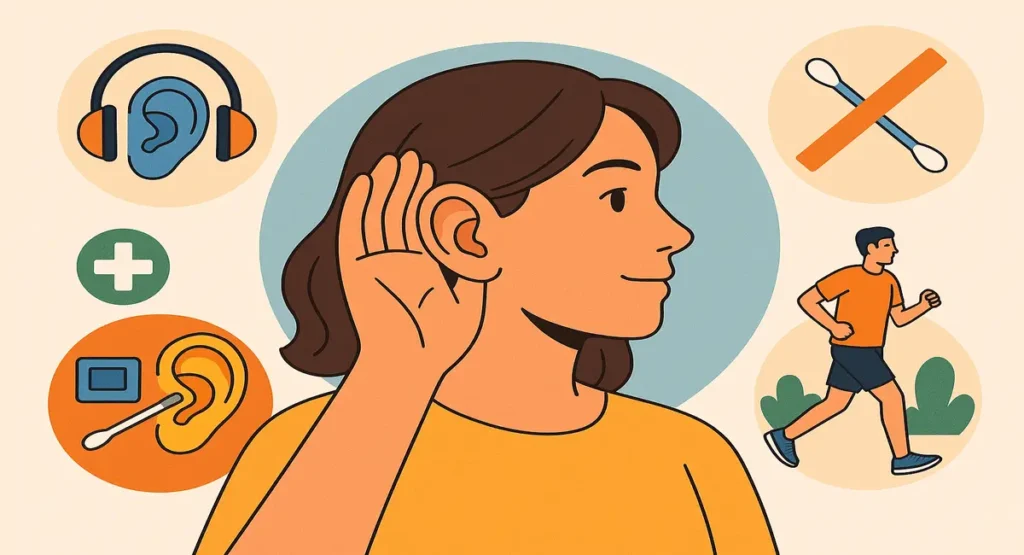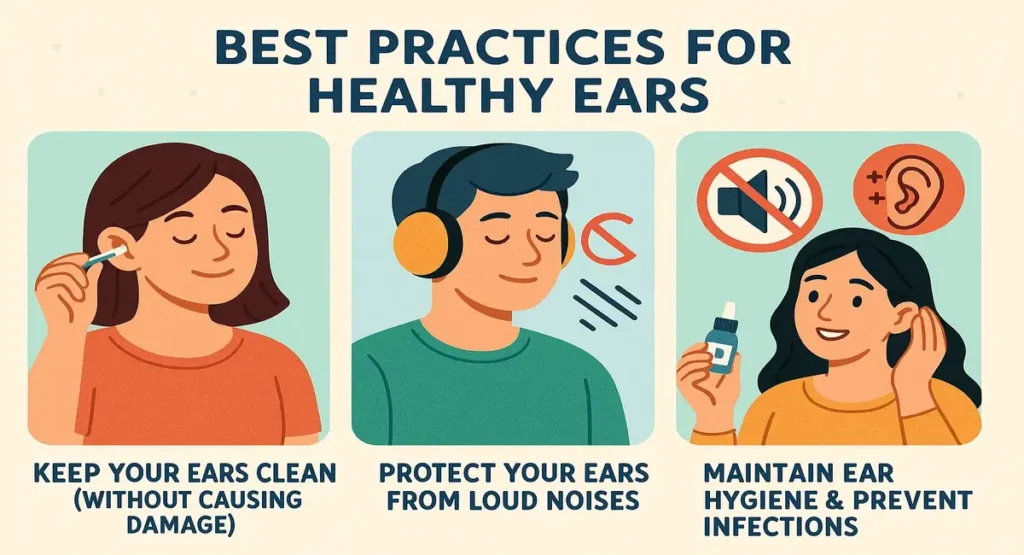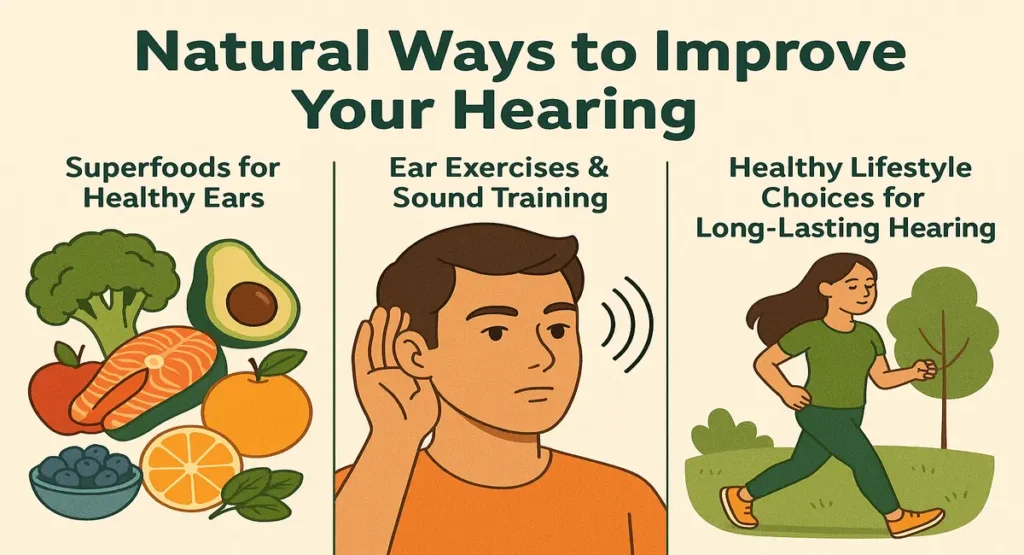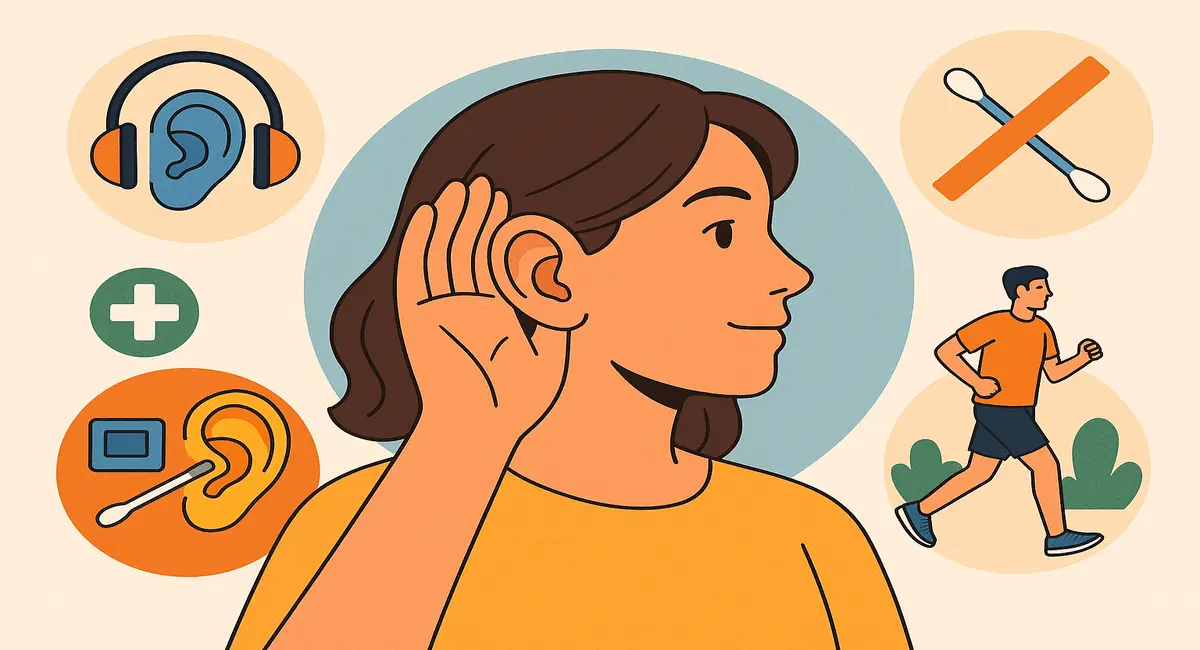Taking care of your ears is just as important as caring for your heart or eyes, but many people overlook hearing health until it’s too late. Your ability to hear clearly plays a vital role in everyday life—helping you stay connected, enjoy conversations, listen to music, and stay aware of your environment.
In this expert-backed guide, you’ll discover safe, natural ways to improve your hearing, protect your ears from common causes of damage, and maintain strong hearing as you age. We’ll also introduce Quietum Plus, a 100% natural supplement designed to support long-term ear health and better hearing—based on science and trusted by users worldwide.
Table of Contents
Why Hearing Health Matters
Good hearing isn’t just about sound—it’s essential for communication, safety, mental health, and quality of life. Whether you’re chatting with loved ones, enjoying your favorite music, or staying alert to your surroundings, your ears play a vital role every day.
Although hearing plays a vital role in daily life, many individuals overlook the early signs of hearing loss. A common misconception is that hearing loss only affects seniors, but the reality is very different. Hearing problems can occur at any age due to various factors, such as:
- Frequent exposure to loud environments, including concerts, heavy machinery, or even headphones at high volume
- Long-lasting ear infections or ear-related health problems that haven’t been treated
- Inherited genetic traits that increase the risk of early hearing decline
- Certain medications, called ototoxic drugs, may harm your hearing over time.
- Improper ear care or excessive earwax, which can block sound transmission
- If left unaddressed, hearing loss can lead to more serious issues—like memory problems, difficulty focusing, emotional stress, and even accidents caused by missed sounds or warnings.

Protecting your ears and addressing hearing issues early can go a long way in preventing long-term damage. Including ear health in your daily wellness routine is a smart way to support better hearing and overall well-being at any age.
Understanding Hearing Loss: Causes and Early Signs
Types of Hearing Loss
Hearing loss is generally classified into three primary types:
- Conductive Hearing Loss: This occurs when sound waves are unable to pass efficiently through the outer or middle ear due to blockages, infections, or structural damage.
- Sensorineural Hearing Loss: Occurs when the inner ear or auditory nerve is damaged, affecting the ability to process sound signals properly.
- Mixed Hearing Loss: A condition that combines elements of both conductive and sensorineural hearing loss, leading to a more complex hearing impairment.
Common Causes of Hearing Problems
- Aging (Presbycusis): A gradual decline in hearing ability due to the natural aging process, leading to wear and tear on the auditory system over time.
- Noise Exposure: Being around loud noises for an extended period, like at concerts or near heavy machinery, can have a lasting impact on your hearing.
- Ear Infections: If left untreated, ear infections can cause lasting damage, potentially leading to hearing loss and other complications.
- Genetics: A person’s family history plays a significant role in their likelihood of developing hearing loss, as genetic factors can contribute to an increased risk.
- Lifestyle Habits: Unhealthy lifestyle choices such as smoking, an unbalanced diet, and a sedentary routine can take a toll on your ear health.
Early Signs of Hearing Loss
1. Persistent Tinnitus (Ringing or Buzzing in the Ears) – If you constantly hear a ringing, buzzing, hissing, or whistling sound in your ears—especially when there’s no external noise—it could be a sign of hearing loss. Tinnitus often indicates damage to the inner ear and can be caused by prolonged exposure to loud noises, aging, or underlying health conditions.
2. Sounds Seem Muffled or Distorted – If voices, music, or everyday noises start sounding unclear, as if they’re coming through a tunnel or a blocked speaker, it may signal hearing loss. You might struggle to distinguish words, making it difficult to understand people even when they speak clearly. This could be due to ear infections, fluid buildup, or gradual nerve damage in the ears.
3. Difficulty Understanding Conversations, Especially in Noisy Environments – If you find yourself asking people to repeat themselves often or straining to hear conversations in restaurants, gatherings, or crowded places, it could be a red flag. Background noise can make it particularly challenging for those experiencing hearing loss, as the brain struggles to filter and process speech effectively. This issue can lead to frustration, social withdrawal, or misunderstandings in daily interactions.
If you experience any of these symptoms, it’s essential to consult an audiologist for a professional evaluation. For those looking for a natural approach to support ear health, consider trying Quietum Plus, a supplement designed to promote auditory function.
Best Practices for Healthy Ears
Keep Your Ears Clean (Without Causing Damage)
Proper ear hygiene is essential for maintaining healthy hearing, but cleaning your ears the wrong way can do more harm than good. A lot of people use cotton swabs to clean their ears, but instead of helping, they usually end up pushing the earwax further inside the ear canal. This can lead to blockages, discomfort, or even damage to the eardrum.
The safest way to clean your ears at home is by gently wiping the outer ear with a soft, damp cloth. For deeper cleaning, consider using over-the-counter ear drops designed to soften and remove excess wax without harming your ears. Avoid putting anything into your ear canal — it can irritate the skin or even cause damage. It’s important to remember that earwax plays a protective role.
It naturally traps dust, debris, and bacteria, keeping your ear canal clean and reducing the risk of infections. Instead of removing all earwax, focus on safe, gentle cleaning methods that support your ear’s natural defenses and help improve your overall hearing health.
Protect Your Ears from Loud Noises
Regular exposure to loud sounds—especially anything over 85 decibels—can slowly damage the tiny hair cells in your inner ear, which may eventually cause permanent hearing loss. Everyday noise from traffic, concerts, or loud headphones may seem harmless but can build up over time and affect your hearing. To protect your ears from loud noises, use earplugs or noise-canceling headphones in loud environments like concerts, construction sites, or busy commutes.
Choose headphones with a high Noise Reduction Rating (NRR) and active noise cancellation (ANC) to reduce harmful sound levels and enjoy safer listening. Protecting your hearing today can help you enjoy better sound for years to come—because once it’s gone, it doesn’t come back.

Maintain Ear Hygiene & Prevent Infections
Keeping your ears clean and healthy is key to preventing infections that can lead to hearing problems. When left untreated, ear infections can damage the eardrum or inner ear, which may result in temporary or even permanent hearing loss. Getting treated early can prevent serious long-term health problems.
Ear infections often show up as ear pain, swelling, fluid coming from the ear, or trouble hearing clearly. You may also feel pressure or fullness in the ear, which can make daily activities uncomfortable. These symptoms can range from mild to severe, so it’s important not to ignore them.
If your symptoms aren’t getting better after a few days or start to feel worse, it’s best to consult a doctor. A healthcare professional can properly diagnose the issue and provide the right treatment to protect your hearing and overall ear health.
Natural Ways to Improve Your Hearing
Support your hearing health naturally by building good habits and taking proper care of your ears. While hearing aids and medical treatments help in severe cases, simple lifestyle changes, a nutritious diet, and regular ear exercises can strengthen your hearing over time. Below are some proven, natural methods to support and maintain healthy ears at any age.
Superfoods for Healthy Ears
- Best Foods for Better Hearing: Boost your hearing naturally with nutrient-rich foods! Include fatty fish like salmon and mackerel for omega-3s, nuts for essential vitamins, citrus fruits for immune support, and leafy greens for overall ear health.
- Essential Vitamins and Minerals: Boost your well-being with vital nutrients like Omega-3 fatty acids for brain and heart health, magnesium for muscle function, zinc for immunity, and vitamins A, C, and D for vision, skin, and bone strength.
Ear Exercises & Sound Training
- How Ear Exercises Enhance Hearing: Regular ear exercises boost blood circulation to the ears, enhancing oxygen supply and nerve function. They also strengthen the brain’s auditory processing, improving sound recognition and clarity.
- Simple Auditory Training Exercises: Enhance your listening skills by practicing how to identify and focus on specific sounds in noisy settings. This exercise helps improve concentration and auditory perception, making it easier to distinguish important sounds amidst background noise. Perfect for sharpening your hearing in busy environments.
- Brain-Training Activities: Boost auditory skills and memory with specialized apps focused on enhancing sound recognition and cognitive function. These tools offer engaging exercises to sharpen mental agility while improving focus and retention, making them ideal for brain health and development.

Healthy Lifestyle Choices for Long-Lasting Hearing
- Impact of Smoking and Alcohol: Smoking and excessive alcohol consumption can harm your hearing by reducing blood flow to the ears. This restriction in circulation may damage delicate ear structures, potentially leading to hearing loss over time. Avoiding these habits can help protect your auditory health and maintain better overall well-being.
- Importance of Staying Hydrated: Proper hydration maintains ear fluid balance, essential for hearing and preventing issues like infections or dizziness. Drinking enough water ensures optimal ear function and overall well-being. Stay hydrated to support your ears and health.
- How Stress Affects Hearing: Chronic stress can worsen tinnitus and hearing issues by increasing cortisol levels, which may harm the auditory system. It also heightens sound sensitivity, making conditions like ringing in the ears more noticeable. Managing stress through relaxation or therapy can help protect hearing health.
For those seeking a natural boost, Quietum Plus combines essential nutrients to support auditory health and overall well-being.
Ready to give your ears the natural support they deserve? Try Quietum Plus today and experience the benefits of a science-backed, 100% natural solution for ear health. [Click here to learn more and order now!]
We always recommend our users to contact healthcare professional before taking any medicines or supplements.
Home Remedies & Therapies for Hearing Health
Exploring natural and alternative approaches can complement your hearing care routine, but it’s essential to do so wisely and under proper guidance. While these remedies aren’t replacements for medical treatment, some may offer supportive benefits when used correctly.
Essential oils, such as tea tree oil, are often used for their anti-inflammatory and soothing properties. Some believe they can support ear health when used around the ear area. However, applying essential oils near or inside the ear should always be done with caution. It’s best to consult a healthcare provider before trying any oil-based remedy to avoid irritation or further complications.
Acupuncture has been studied for its possible role in improving hearing and reducing symptoms like tinnitus. Although early research shows some promise, the overall scientific evidence remains limited. Further studies are needed to better understand how effective acupuncture is for improving hearing health.
Practices like yoga and meditation may not directly restore hearing, but they can help lower stress and improve mental clarity, which plays a role in how we process sound. Regular practice can enhance focus and reduce tension that may contribute to hearing difficulties, especially in noisy or overstimulating environments.
Incorporating these holistic methods into your lifestyle—alongside professional hearing care—can support overall ear wellness and contribute to long-term auditory health.
Technology & Medical Solutions for Hearing Loss
If you’re struggling to follow conversations, hear in noisy environments, or keep up at work, it might be time to consider professional help. Hearing loss that interferes with daily life should be evaluated by a licensed audiologist, who can assess your condition and recommend the most effective solution based on your hearing needs.
Today’s hearing aids are far more advanced than ever before. Whether you have mild or severe hearing loss, modern devices come equipped with features like Bluetooth connectivity, noise cancellation, and personalized sound settings. These innovations allow users to enjoy clearer sound and a more natural listening experience.
For people with severe or profound hearing loss, cochlear implants can be a more effective solution than regular hearing aids. Unlike hearing aids that only make sounds louder, cochlear implants send signals directly to the hearing nerve, helping provide clearer sound for those who don’t get enough benefit from amplification alone.
Thanks to ongoing advancements, AI-powered hearing aids and smartphone-connected apps are revolutionizing hearing care. These tools allow real-time sound adjustments, environmental awareness, and remote support from hearing specialists—all designed to improve comfort, convenience, and overall quality of life for users.
Myths & Facts About Hearing Health
| MYTHS | FACTS |
|---|---|
| Hearing loss only affects the elderly. | Hearing loss can impact people of all ages due to factors like loud noise exposure, infections, or genetic conditions. |
| Hearing aids restore hearing to normal. | Hearing aids improve sound amplification but cannot fully replicate natural hearing. They enhance clarity and communication, not complete restoration. |
Final Tips & Takeaways
- Shield your ears from loud noises to prevent long-term damage.
- Adopt a balanced diet and active lifestyle to promote overall ear health.
- Consult a specialist immediately if you notice any hearing concerns.
- Explore natural supplements like Quietum Plus to aid in maintaining healthy hearing.
FAQs About Hearing Health
Can hearing loss be reversed naturally?
Most hearing loss is permanent, but early intervention and ear protection can prevent further damage. Temporary issues like earwax buildup can often be treated.
How can I hear better in noisy environments?
Use noise-canceling headphones, practice active listening, and position yourself close to the speaker to reduce background noise.
What are the best earplugs for sleeping and concerts?
For sleeping, soft silicone or foam earplugs with high NRR work best. For concerts, musician’s earplugs preserve sound clarity while lowering harmful noise levels.
Is hearing loss genetic?
Yes, genetics can contribute to hearing loss, but lifestyle and environmental factors also play a major role in overall hearing health.
Do over-the-counter hearing aids work?
OTC hearing aids help with mild hearing loss but lack the customization of prescription aids. Severe cases should be evaluated by an audiologist.
Are you searching for an effective and natural way to maintain healthy hearing? Quietum Plus is a 100% natural supplement designed to promote ear health and improve auditory function. [Click here to learn more and order now!]
Conclusion: Take Control of Your Hearing Health Today
Your hearing is a precious gift that deserves care and attention. By following the tips in this guide, you can protect your ears, improve your hearing naturally, and enjoy a better quality of life. For those looking for a natural solution to support ear health, Quietum Plus offers a 100% natural formula designed to promote auditory function and overall well-being.
Ready to take the first step toward better hearing? Try Quietum Plus today and experience the benefits of a natural, science-backed solution for ear health. [Click here to learn more and order now!]
We always recommend our users to contact healthcare professional before taking any medicines or supplements.
Sources
At Make Human Healthy, we are committed to providing accurate and reliable health information. We ensure that all content is backed by scientific research, peer-reviewed studies, and credible health organizations. Our resources are carefully selected to maintain the highest standards of integrity, transparency, and reliability, so you can trust the information we provide.
Summa Health:- 7 Ways to Protect Your Ears and Prevent Hearing Loss – https://www.summahealth.org/flourish/entries/2023/03/7-ways-to-protect-your-ears-and-prevent-hearing-loss
South East Hearing Care Centres:- 10 Tips On How To Care For Your Ears Properly – https://www.hearingcarecentres.co.uk/10-tips-care-ears-properly/
American Medical Association:- What doctors wish patients knew about proper ear care – https://www.ama-assn.org/delivering-care/public-health/what-doctors-wish-patients-knew-about-proper-ear-care
The Hearing Care Partnership:- 10 Tips for Healthy Ears – https://www.thcp.co.uk/articles/10-tips-for-healthy-ears
Aanvi Hearing:- How to Improve Your Hearing: Essential Tips for Better Ear Health – https://aanviihearing.com/blogs-on-hearing-health/how-to-improve-your-hearing-essential-tips-for-better-ear-health
GoodRx:- Healthy Ears: Ear Care and Hearing – https://www.goodrx.com/health-topic/ear
Cleveland Clinic:- Hearing Loss – https://my.clevelandclinic.org/health/diseases/17673-hearing-loss
hearing Health Foundation:- Protect Your Hearing – https://hearinghealthfoundation.org/keeplistening/protect
Affiliate Disclosure: This post may contain affiliate links. If you make a purchase through these links, I may earn a small commission at no extra cost to you. This helps support the blog and allows me to continue creating helpful content. Thank you for your support!
This content is written by Dr. Arshi Thakur. If you found this content helpful, please consider sharing it on your social media to help others benefit from it!
Please note: Our website services, content, and products are for informational purposes only. Make Human Healthy does not provide medical advice, diagnosis, or treatment.

